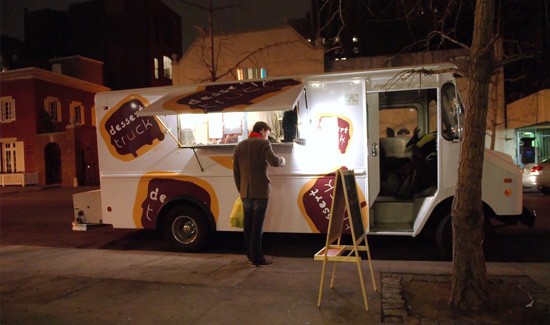Wendy Bryan of Santa Ana, thank you for writing (“All In La Familia”, Letters, Oct. 12). At least someone cared enough to write in about the article alleging impropriety on Santa Ana Mayor Miguel Pulido's part; that said, I have some problems with your statements about food trucks in general.

]
“Street and truck vendors are unfair competition for
brick-and-mortar businesses in Santa Ana, which have to pay rent and
other overhead costs.”
So
do food trucks. They don't own the trucks, they lease them from a
leasing company; they lease kitchen space, they still have to pay their
employees. They still have to be licensed (granted, some are not
licensed, but some bricks-and-mortar restaurants aren't either).
Bricks-and-mortar places pay for electricity; trucks pay for gas.
Mobile
food vendors and bricks-and-mortar restaurateurs are generally not
competing for the same segment of the population. No one is going to be
on your way to a lovely sit-down restaurant with waiter service and a
nice glass of wine if you want it, then suddenly pass a taco truck and
abandon your dinner plans.
Food trucks do not pay the same taxes
as bricks-and-mortar restaurants, and aren't subject to the same health
inspections. The former is a political topic waiting for a politician
to wake up and smell the revenue stream, and the latter can be taken
care of through licensing the way it is for bricks-and-mortar stores.
Neither of these is insurmountable.
“Unfair” is a spin word. Competition is not per se unfair just through its existence, though it seems so to the people with a new source of competition.
“They make messes, disrespect the law (parking all
day in one spot, health standards are debatable) and generally are a
nuisance.”
So
it's okay when cars park in a spot all day (say, people spending the
day at home), but not when a food truck does it? If the parking all day
is a nuisance, a petition to the city for restricted or limited-time
parking is the answer. It can be enforced with towing; even trucks who
consider parking tickets a cost of doing business will think twice
about having a truck they don't own be towed to an impound lot.
The
health standards canard is a non-starter. It is impossible to have poor
hygienic standards when customers can see every aspect of the
operation. Taco tables are particularly prone to this, because the food
is prepared directly in front of the customers. If the people who run a
taco table have poor hygienic practices, it will be obvious; there
won't be any customers.
The chance of food-borne illness is
frankly much higher when dining in chain restaurants than when eating
street food. When someone gets food poisoning at a chain burger joint,
it's treated as a one-off and doesn't generally reflect on the chain as
a whole; the business doesn't suffer particularly from one incident of
food poisoning. When someone gets food poisoning at a taco truck, they
talk, and the truck more often than not goes out of business.
Restaurateurs
view food trucks as evil because they prefer not to have the
competition. If a food truck is parking outside a restaurant and
stealing its business, the answer is to adapt. Food trucks can
only steal a client base when the products are similar, so the
restaurateurs should evolve their business to ensure that they aren't
similar. While whining and crying wolf to the authorities can be
effective, the better answer is to compete–and win.
That entrepreneurial spirit is why America is the economic powerhouse it is. You're missing a lot of great food if you won't eat at catering trucks.

